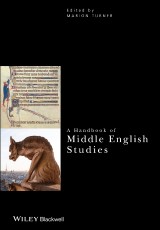Details

A Handbook of Middle English Studies
Critical Theory Handbooks 1. Aufl.
|
119,99 € |
|
| Verlag: | Wiley-Blackwell |
| Format: | EPUB |
| Veröffentl.: | 30.01.2013 |
| ISBN/EAN: | 9781118328767 |
| Sprache: | englisch |
| Anzahl Seiten: | 464 |
DRM-geschütztes eBook, Sie benötigen z.B. Adobe Digital Editions und eine Adobe ID zum Lesen.
Beschreibungen
<b>A Handbook of Middle English Studies</b> <p>“This sharp-minded, coherent set of essays both maps and liberates: not only does it map the intellectual territory of contemporary cultural debate; it also liberates the extraordinary texts of later medieval England to move across that contemporary cultural terrain.”<BR><i>James Simpson, Harvard University </i> <p>“Marion Turner has skilfully choreographed an exciting ensemble of fresh accounts of the English Middle Ages. We see the period in a new light that shows with compassion and imagination, as well as thoughtful scholarship, how the literature of the past speaks to contemporary preoccupations.”<BR><i>Ardis Butterfield, Yale University </i> <p>“Strikingly original: theory-literate and materially-grounded ways of reading Middle English texts.”<BR><i>David Wallace, University of Pennsylvania </i> <p><i>A Handbook of Middle English Studies</i> presents twenty-six original and accessible essays by leading scholars, analyzing the relationship between critical theory and late-medieval literature. The collection offers a range of entry points into the rich field of medieval literary studies, exploring subjects including the depiction of the self and the mind, the literature of conquest, ideas of beauty and aesthetics, and the relationship between place and literature. Topics that have long been central to the field, such as authorship, gender, and race, feature alongside areas only recently coming under critical scrutiny, such as globalization, the environment, and animality. Collectively, the essays demonstrate that the manuscript culture of late medieval literature raises key theoretical issues concerning the relationship between authors, texts, and readers. <i>A Handbook of Middle English Studies</i> models diverse approaches to medieval texts and stakes a claim in debates about topics ranging from class to the canon, from imagination to nationhood, from sexuality to the public sphere.
<p>Acknowledgments xi</p> <p>Notes on Contributors xiii</p> <p>Abbreviations xvii</p> <p>List of Figures xix</p> <p>Introduction 1<br /> <i>Marion Turner</i></p> <p><b>Part 1: Selfhood and Community 13</b></p> <p>1 Imagination 15<br /> <i>Aranye Fradenburg</i></p> <p>2 Memory 33<br /> <i>Anke Bernau</i></p> <p>3 Desire 49<br /> <i>Elizabeth Scala</i></p> <p>4 Gender 63<br /> <i>Nicola McDonald</i></p> <p>5 Sexuality 77<br /> <i>Glenn Burger and Steven F. Kruger</i></p> <p>6 Public Interiorities 93<br /> <i>David Lawton</i></p> <p>7 Race 109<br /> <i>Jeffrey Jerome Cohen</i></p> <p>8 Animality 123<br /> <i>Susan Crane</i></p> <p><b>Part 2: Constructing Texts, Constructing Textual History 135</b></p> <p>9 Authorship 137<br /> <i>Vincent Gillespie</i></p> <p>10 Audience 155<br /> <i>Joyce Coleman</i></p> <p>11 Manuscript 171<br /> <i>Alexandra Gillespie</i></p> <p>12 Material Culture 187<br /> <i>Jessica Brantley</i></p> <p>13 Genre 207<br /> <i>Julie Orlemanski</i></p> <p>14 Aesthetics 223<br /> <i>Maura Nolan</i></p> <p>15 Canon Formation 239<br /> <i>Thomas A. Prendergast</i></p> <p>16 Periodization 253<br /> <i>David Matthews</i></p> <p><b>Part 3: Politics and Places 267</b></p> <p>17 Sovereignty 269<br /> <i>Robert Mills</i></p> <p>18 Class 285<br /> <i>Isabel Davis</i></p> <p>19 Church 299<br /> <i>Laura Varnam</i></p> <p>20 City 315<br /> <i>Jonathan Hsy</i></p> <p>21 Margins 331<br /> <i>Corinne Saunders</i></p> <p>22 Ecology 347<br /> <i>Carolyn Dinshaw</i></p> <p>23 Nation 363<br /> <i>Kathy Lavezzo</i></p> <p>24 Language 379<br /> <i>Laura Ashe</i></p> <p>25 Postcolonialism 397<br /> <i>John M. Ganim</i></p> <p>26 A Global Middle Ages 413<br /> <i>Geraldine Heng</i></p> <p>Index 431</p>
<p><b>Marion Turner</b> is Tutorial Fellow in English Literature at Jesus College, University of Oxford. She is the author of <i>Chaucerian Conflict: Languages of Antagonism in Late Fourteenth-Century London</i> (2007), and numerous articles on latemedieval literature, especially on Chaucer. She is currently editing a volume about literature and medicine, and is also working on a biography of Chaucer.</p>
<p>“This sharp-minded, coherent set of essays both maps and liberates: not only does it map the intellectual territory of contemporary cultural debate; it also liberates the extraordinary texts of later medieval England to move across that contemporary cultural terrain.”<BR><i>James Simpson, Harvard University </i></p> <p>“Marion Turner has skilfully choreographed an exciting ensemble of fresh accounts of the English Middle Ages. We see the period in a new light that shows with compassion and imagination, as well as thoughtful scholarship, how the literature of the past speaks to contemporary preoccupations.”<BR><i>Ardis Butterfield, Yale University </i> <p>“Strikingly original: theory-literate and materially-grounded ways of reading Middle English texts.”<BR><i>David Wallace, University of Pennsylvania </i> <p><i>A Handbook of Middle English Studies</i> presents twenty-six original and accessible essays by leading scholars, analyzing the relationship between critical theory and late-medieval literature. The collection offers a range of entry points into the rich field of medieval literary studies, exploring subjects including the depiction of the self and the mind, the literature of conquest, ideas of beauty and aesthetics, and the relationship between place and literature. Topics that have long been central to the field, such as authorship, gender, and race, feature alongside areas only recently coming under critical scrutiny, such as globalization, the environment, and animality. Collectively, the essays demonstrate that the manuscript culture of late medieval literature raises key theoretical issues concerning the relationship between authors, texts, and readers. <i>A Handbook of Middle English Studies</i> models diverse approaches to medieval texts and stakes a claim in debates about topics ranging from class to the canon, from imagination to nationhood, from sexuality to the public sphere.
<p>“This sharp-minded, coherent set of essays both maps and liberates: not only does it map the intellectual territory of contemporary cultural debate; it also liberates the extraordinary texts of later medieval England to move across that contemporary cultural terrain.”—<i><b>James Simpson, Harvard University<br /> </b></i></p> <p>“Marion Turner has skilfully choreographed an exciting ensemble of fresh accounts of the English middle ages. We see the period in a new light that shows with compassion and imagination, as well as thoughtful scholarship, how the literature of the past speaks to contemporary preoccupations.”—<b><i>Ardis Butterfield, Yale Unviersity</i></b></p> <p>“Strikingly original: theory-literate and materially-grounded ways of reading Middle English texts.”—<b><i>David Wallace, University of Pennyslvania</i></b></p>


















